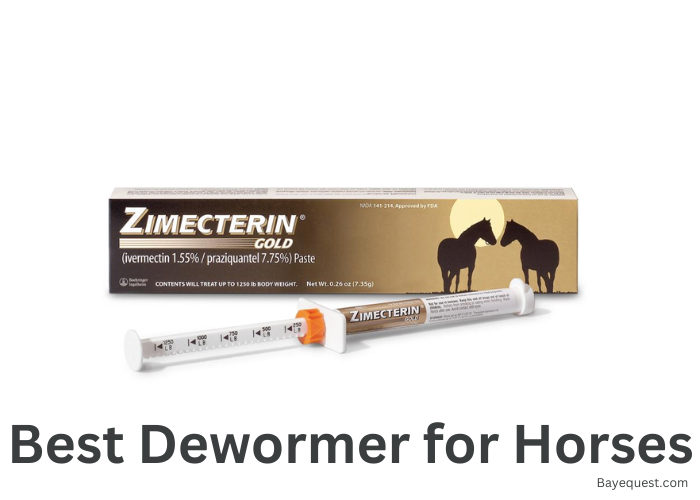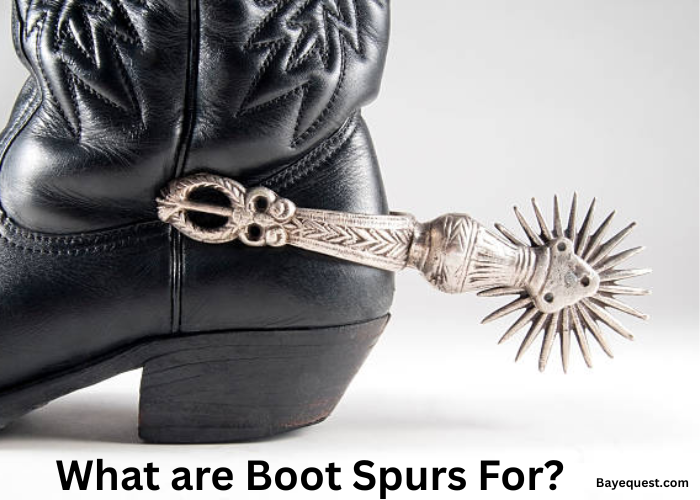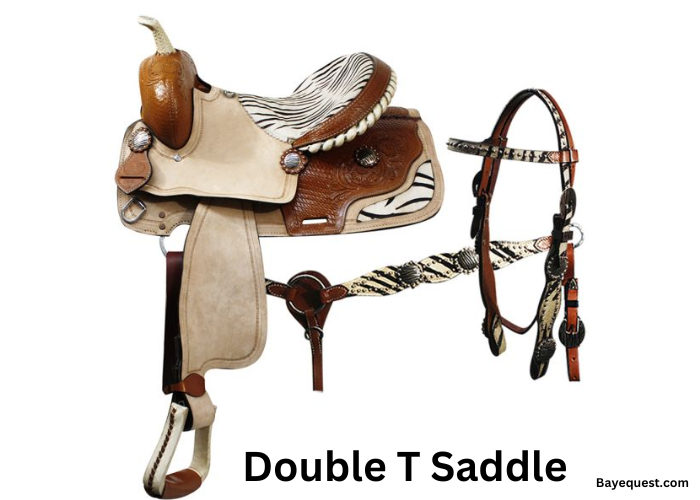Keeping your horse healthy means protecting it from parasites. Worms can cause weight loss, poor coat, and even serious illness.
A good deworming plan helps your horse stay strong and active. However, with numerous products available, it can be challenging to determine which ones work best.
This guide will break down the types of horse dewormers and how they work. You’ll also learn how often to treat, what to look for, and tips for using dewormers safely.
Let’s help you choose the best dewormer so your horse can live its healthiest life.
Best Dewormer for Horses: Key Takeaway
- Best Overall Horse Dewormer – Panacur
- Best Bang for the Buck – Vetrimec Paste
- Best Dewormer for Broad-Spectrum Parasite Control – Zimecterin Gold
- Best Dewormer for Rotational Programs – DuraMectin Ivermectin Paste
- Best Dewormer for Pinworm and Strongyle Control – Durvet Pyrantel Paste
- Best Dewormer for Everyday Value and Reliability – Jeffers Ivermectin Paste
- Best Dewormer for Horses of All Ages – Farnam PyrantelCare
Understanding Parasites in Horses
Parasites are a hidden danger in every horse’s world. They steal nutrients, cause illness, and can even threaten your horse’s life if left untreated.
From strongyles to roundworms, these tiny invaders love to set up horse’s digestive system.
Strongyles are among the most common parasites. They can damage your horse’s gut and even harm blood vessels.
Small strongyles are sneaky. They bury themselves in the gut wall and wait to strike later.
Foals have their parasite problem. Roundworms can block their intestines and leave them weak and underweight.
Tapeworms, on the other hand, gather where the small intestine meets the cecum and raise the risk of painful colic.
And don’t forget bots. The nasty larvae from botflies. They stick to the stomach lining and irritate the tissue while stealing your horse’s nutrition.
Parasites spread easily, especially in shared pastures and barns. They multiply fast, making it hard to get rid of them without a plan.
That’s why regular deworming, smart pasture management, and simple fecal egg count checks are so important. These steps protect your horse and keep parasites from taking over.
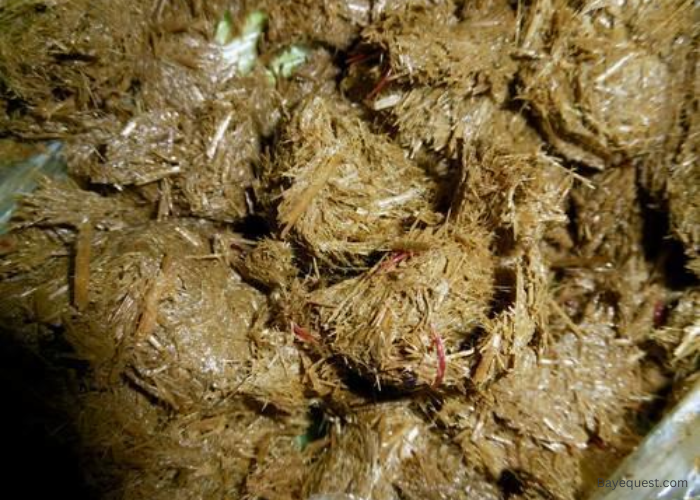
Types of Dewormers for Horses
Horse dewormers are classified into different categories, each with its own method of combating parasites. Let’s break them down.
Benzimidazoles
Benzimidazoles are a trusted type of horse dewormer. They include fenbendazole (such as Panacur) and oxibendazole (such as Anthelcide EQ).
These dewormers block the parasite’s energy supply, which kills it. They work well against strongyles, pinworms, and roundworms.
Benzimidazoles are gentle and safe. Many owners use them for foals and pregnant mares.
They fit well in a rotation plan. However, some parasites are developing resistance to them, so it’s wise to rotate with other products.
Tetrahydropyrimidines
This group of dewormers works by paralyzing the worms. This means the worms cannot move or hold onto the horse’s gut, so they pass out of the horse’s body.
Pyrantel is a common tetrahydropyrimidine. It comes in two forms: pyrantel tartrate and pyrantel pamoate.
They are good at killing many types of roundworms, including ascarids and strongyles. They are also effective against some tapeworms when given in a higher dose.
Macrocyclic Lactones
Macrocyclic lactones are a strong type of dewormer. They work by disrupting the nervous system of the worms, causing them to become paralyzed and die.
Ivermectin and moxidectin are two well-known macrocyclic lactones. These dewormers are highly effective in killing a wide range of worms, including many types of roundworms, lungworms, and even some external parasites, such as bots.
They are often given less often because they stay in the horse’s system for a longer time.
Isoquinolines
Isoquinolines are a specific type of dewormer primarily used to treat tapeworm infections. Praziquantel is the main dewormer in this group.
It works by damaging the outer layer of the tapeworms, which makes them unable to live inside the horse.
Tapeworms can cause serious health problems, and isoquinolines are highly effective in eliminating them. They are often combined with other dewormers to give a broader range of protection.
Combination Dewormers
Combination dewormers contain more than one type of deworming medicine. This means they can fight a wider range of worms simultaneously.
For example, a combination dewormer might have a macrocyclic lactone to kill roundworms and bots, and an isoquinoline to kill tapeworms.
Using a combination of dewormers helps ensure that a wide range of parasites are treated. This can be an effective way to manage worms and keep horses healthy by addressing various worm types with a single treatment.
Factors to Consider When Choosing a Dewormer
Choosing the right dewormer can be a challenge. Horses have different needs depending on their age, health, and lifestyle.
Before you pick a product, keep these key factors in mind to make sure your horse gets the best care possible.
1. Age of the horse
Younger horses and foals have different needs from adult horses. Their bodies are more sensitive, so they need gentle dewormers.
Seniors may also need special care. Always check the product label to make sure it is safe for your horse’s age.
2. Health status
A healthy horse can handle most dewormers. But a weak, sick, or underweight horse may react badly to strong products.
Choose a gentle option if your horse is stressed or recovering from illness. This will help avoid side effects.
3. Type of parasites present
Not all dewormers kill every type of parasite. Strongyles, roundworms, tapeworms, and bots each need different treatments.
A fecal egg count performed by your veterinarian can help identify the specific parasites that are a problem. That way, you can choose the right product.
4. Parasite resistance concerns
Parasites can become resistant if you always use the same dewormer. This makes treatments stop working over time.
Rotate dewormers and do regular fecal egg counts. This helps keep resistance low and protects your horse in the long run.
5. Local climate and season
The weather affects how parasites spread. Warm, wet areas have higher parasite loads. In cold areas, some parasites survive winter in the soil.
Plan deworming at the right times of year to stay ahead of the problem.
6. Ease of administration
Some horses hate pastes. Others spit out pellets.
Pick a product that is easy to give to your horse. This avoids waste and makes deworming less stressful for both of you.
7. Duration of effectiveness
Long-lasting products mean you deworm less often. This saves you time and effort. It also lowers stress for your horse.
Check how long the dewormer works before buying.
8. Veterinary guidance
Your vet is the best partner in building a deworming plan. They know your horse’s health history and local parasite risks.
Ask for their advice before starting or changing a deworming routine.
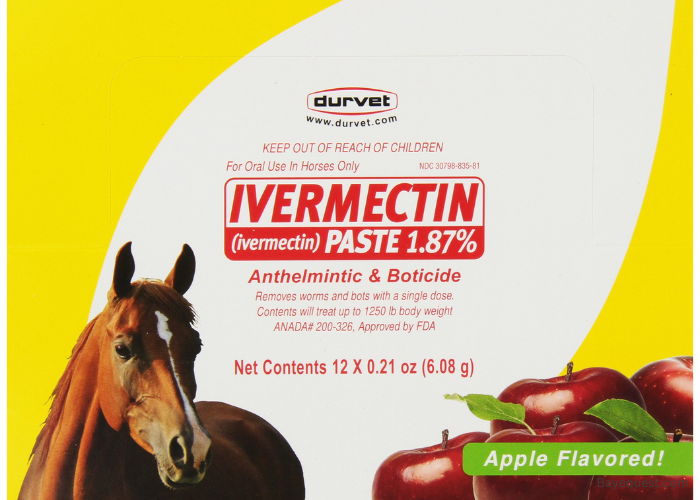
How to Deworm a Horse
Deworming a horse is simple if you follow the right steps.
First, read the product label carefully. Check the dose based on your horse’s weight. It helps to use a weight tape to get a good estimate.
Next, make sure the horse is calm and secure. Many owners use a halter and lead rope for better control.
When using a paste dewormer, insert the syringe into the side of the mouth, past the front teeth. Gently push the plunger to place the paste at the back of the tongue. Hold the horse’s head up for a few seconds so it swallows the medicine.
If you use a feed-through dewormer, mix it thoroughly with grain and monitor your horse to ensure they consume the entire dose.
Always write down the date and product you used. This helps you plan future treatments and avoid giving the same dewormer too often.
Also, remember to consult your veterinarian before starting or changing any deworming plan.
Horse Deworming Schedule
Here’s a simple plan to keep your horse healthy and free from parasites all year long.
| Age Group | Timing | Recommended Dewormers | Parasites Targeted |
| Foals | 2-3 months | Fenbendazole or Pyrantel | Roundworms, Strongyles |
| 4-6 months | Ivermectin | Strongyles, Roundworms, Bots | |
| 9 months | Ivermectin + Praziquantel | Strongyles, Tapeworms, Bots | |
| 12 months | Moxidectin + Praziquantel | Strongyles, Tapeworms, Bots | |
| Repeat as needed | Fecal egg count to guide further treatment | Based on parasite load | |
| Adults | Spring | Ivermectin | Strongyles, Bots |
| Summer | Pyrantel or Fenbendazole | Strongyles, Pinworms | |
| Fall | Ivermectin + Praziquantel | Strongyles, Tapeworms, Bots | |
| Winter | Moxidectin | Strongyles, Bots | |
| As needed | Fecal egg count to fine-tune your program | Based on parasite load |
Worming Plan for Horses Based on Fecal Egg Count
Here’s a simple way to deworm smarter. Using fecal egg counts helps you treat only when necessary, protecting your horse and slowing the development of parasite resistance.
Low Shedder (0–200 Eggs Per Gram of Manure)
Horses with low egg counts don’t need frequent treatments. Here’s how to manage them while keeping parasites under control.
| Time of Year | Action | Recommended Dewormer | Notes |
| Spring | Treat if needed after fecal egg count | Ivermectin or moxidectin | Only deworm if egg count is creeping higher |
| Summer | Fecal egg count | – | No deworming unless egg count rises |
| Fall | Strategic deworming for tapeworms and bots | Ivermectin + praziquantel | Treat regardless of EPG to control seasonal risk |
| Winter | Fecal egg count | – | No routine treatment needed if EPG stays low |
Moderate Shedder (200–500 EPG)
Horses with moderate egg counts need a balanced plan. Here’s how to keep their parasite levels in check without overusing dewormers.
| Time of the year | Action | Recommended Dewormer | Notes |
| Spring | Deworm after fecal egg count | Ivermectin | Target strongyles and bots |
| Summer | Fecal egg count + treat if needed | Pyrantel or fenbendazole | Based on egg count results |
| Fall | Strategic treatment for tapeworms & bots | Ivermectin + praziquantel | Important for seasonal parasite control |
| Winter | Fecal egg count + treat if egg count rises | Moxidectin | Good long-lasting coverage |
High Shedders (>500 EPG)
Horses with high egg counts require close monitoring and a more stringent deworming plan. Here’s how to keep their parasite levels under control.
| Time of the year | Action | Recommended Dewormer | Notes |
| Spring | Deworm after fecal egg count | Ivermectin | Focus on strongyles and bots |
| Early summer | Fecal egg count + treat if needed | Pyrantel or fenbendazole | Repeat testing after treatment |
| Late summer | Follow-up fecal egg count + treat if high | Moxidectin | Provides longer-lasting coverage |
| Fall | Strategic treatment for tapeworms & bots | Ivermectin + praziquantel | Protects against seasonal parasites |
| Winter | Fecal egg count + treat if still high | Moxidectin | Maintain strict monitoring |
7 Best Dewormer for Horses: Product Review
1. Best Overall Horse Dewormer – Panacur
If you’re looking for a trusted and proven dewormer for your horse, Panacur is a solid choice. Its active ingredient, fenbendazole, works against strongyles, pinworms, and roundworms.
It’s also gentle enough for foals and pregnant mares, which makes it a safe choice for nearly any horse on your property.
You’ll find Panacur easy to give, thanks to its paste formulation. The packaging is designed to make dosing simple, even if your horse isn’t thrilled about taking medicine.
The product arrives quickly when you order online, and many horse owners praise it for being easy to administer and mess-free.
Yes, Panacur costs a bit more than other options, but you truly get what you pay for. Its quality results, reliable parasite control, and user-friendly design make it worth every penny.
If you’re looking for a dewormer that delivers peace of mind and proven performance, Panacur should be at the top of your list.
Pros
- Easy to use
- High-quality results
- Gentle on sensitive horses
- Safe for foals and pregnant mares
Con
- More expensive than some brands
2. Best Bang for the Buck – Vetrimec Paste
If you’re looking for an affordable yet effective horse dewormer, Vetrimec Paste is hard to beat. This paste contains ivermectin, which provides broad coverage against gastrointestinal nematodes and bots in horses.
You’ll save money without compromising reliable parasite control, making it a smart choice for your routine deworming regimen.
Before using Vetrimec Paste, consult your veterinarian for guidance. They can help you build a targeted parasite control program, especially if you’re managing mares, foals, or yearlings.
For foals, you’ll usually start treatment around 6 to 8 weeks of age, then continue on a routine schedule as needed.
Vetrimec Paste is designed for easy administration and fits well into a year-round parasite program. It works well, covers a wide range of parasites, and is much cheaper than many competing brands.
If you want solid performance on a tight budget, this paste is a reliable pick that helps keep your horses healthy without breaking the bank.
Pros
- Affordable compared to most brands
- Covers nematodes and bots
- Broad-spectrum treatment
- Easy-to-administer paste
Con
- It should always be used under your veterinarian’s guidance
3. Best Dewormer for Broad-Spectrum Parasite Control – Zimecterin Gold
If you want a dewormer that effectively treats multiple parasites simultaneously, Zimecterin Gold is a smart choice.
This paste removes tapeworms, roundworms, and bots in just one single dose. That saves you time and gives your horse quick protection.
Each tube treats horses weighing up to 1,250 pounds. The syringe features clear markings, allowing you to measure the dose without guesswork.
It’s also designed for easy oral use. You place the paste at the back of the horse’s tongue, hold the head up for a few seconds, and you’re done.
Zimecterin Gold is strong and effective. It’s a great option if you want broad-spectrum parasite control in a simple, easy-to-use product.
Pros
- Removes tapeworms, roundworms, and bots in one dose
- Works for horses up to 1,250 pounds
- Easy-to-use syringe
- Broad-spectrum coverage
Con
- Slightly more expensive than basic ivermectin pastes
4. Best Dewormer for Comprehensive Parasite Coverage – DuraMectin Ivermectin Paste
If you’re looking for a strong and affordable dewormer that covers nearly every major parasite, DuraMectin Ivermectin Paste is a great choice. It uses 1.87% ivermectin to treat and control a long list of parasites in horses.
You can rely on it to fight large and small strongyles, pinworms, ascarids, hairworms, lungworms, stomach worms, bots, and intestinal threadworms. It even targets parasites linked to skin problems, such as summer sores and dermatitis.
DuraMectin tackles early larval stages of many worms. That means you stop parasites before they do serious harm.
You’ll receive a simple paste that is easy to administer by mouth, accompanied by a well-marked syringe to help you measure the correct dose.
This product is budget-friendly yet delivers powerful results. It’s a solid choice for routine deworming if you want to keep your horse protected without overspending.
Pros
- Covers a very broad range of parasites
- Kills both adult and larval stages
- Budget-friendly
- Easy to administer
Con
- Does not treat tapeworms
5. Best Dewormer for Pinworm and Strongyle Control – Durvet Pyrantel Paste
If you’re looking for an easy way to treat strongyles and pinworms, Durvet Pyrantel Paste is a great option.
This dewormer helps remove and control mature infections caused by large and small strongyles, pinworms, and large roundworms. Each dose gives your horse 3 mg of pyrantel pamoate per pound of body weight.
The paste is intended for oral use only and is available in a tasty apple flavor that many horses enjoy. You will find it easy to feed, even for the most discerning eaters.
It’s safe for use in many types of horses, including pregnant mares, nursing mares, and foals who are at least two months old.
Durvet Pyrantel Paste comes in a 23.6-gram tube, making it easy to measure and administer the correct amount.
If you want to keep pinworms and strongyles under control, this product is a budget-friendly and reliable choice.
Pros
- Targets strongyles, pinworms, and roundworms
- Apple flavor for better acceptance
- Safe for pregnant and nursing mares
- Easy-to-feed paste
Con
- Does not cover tapeworms or bots
6. Easiest to Admit Dewormer for Horses – Jeffers Ivermectin Paste
If you want strong protection at a fair price, Jeffers Ivermectin Paste is a great choice. This paste contains 1.87% ivermectin, providing broad-spectrum protection against various parasites.
It controls worms, bots, and other parasites to keep your horse healthy and performing at its best.
The paste is simple to use. You can measure and give the right dose without much trouble.
Just place the paste at the back of your horse’s tongue, hold the head up for a few seconds, and let your horse swallow. The clear markings on the tube help you dose correctly every time.
You can trust this product because it comes from Dechra, a respected name in the horse care world. Their ivermectin paste is reliable and consistent, so you can feel confident about using it for routine deworming.
It is a practical option if you want proven results without incurring a significant expense.
Pros
- Broad-spectrum parasite control
- Easy-to-give paste
- Trusted and reliable brand
- Good value for the money
Con
- Does not treat tapeworms
7. Best Dewormer for Horses of All Ages – Farnam PyrantelCare
If you want a dewormer that works for every horse in the barn, Farnam PyrantelCare is a smart pick. These medicated pellets protect against 31 common parasites, including large and small strongyles, ascarids, and pinworms.
You get daily, continuous protection simply by mixing these pellets with your horse’s grain.
The formula contains double-strength pyrantel tartrate at 2.11%, providing powerful results in a safe manner. It’s approved for horses of all ages, from young foals to pregnant or nursing mares, and even breeding stallions.
You don’t have to worry about harming fertility or growth when you feed this product as directed.
One of the best things is how easy it is to use. The pellets taste good to most horses, so there’s no fight like you might get with a paste or liquid dewormer.
Farnam PyrantelCare makes daily parasite control simple and stress-free for you and your horse.
Pros
- Safe for horses of all ages
- Continuous parasite protection
- Palatable, easy-to-feed pellets
- Double-strength formula
Con
- Must be fed daily for best results
How Often Should You Deworm Your Horse?
How often you deworm your horse depends on its age, health, and parasite risk. In the past, people administered dewormers every two months, but this can lead to resistance.
Today, most vets recommend using a fecal egg count to guide your plan.
For many adult horses with low egg counts, treating twice a year may be sufficient. High shedders or young horses may need deworming more frequently, sometimes as often as three to four times a year.
Always target treatments to the parasites found on your farm and the season of the year.
Work with your vet to set up a program that fits your horse’s needs. Testing before treating will help prevent overusing dewormers and protect these important medicines for the future.
Tips for Effective Deworming of Horses
A good deworming plan takes more than just giving medicine. Always weigh your horse to ensure you give the correct dose.
Follow the label directions and make sure your horse swallows the full amount.
Try to do fecal egg counts at least once or twice a year. This shows you what parasites are there and helps avoid resistance.
Rotate between different types of dewormers if your vet recommends it.
Keep your pastures clean by picking up manure and rotating grazing areas. Parasites spread fast in dirty fields.
Good pasture habits and smart deworming practices work together to keep your horse healthy throughout the year.

Conclusion
Parasites can cause significant problems for your horse if left unattended. A smart deworming plan protects your horse and saves you money in the long run.
Always consult your veterinarian to develop the best program for your farm. Use fecal egg counts to guide the frequency of treatment.
Also, choose products that fit your horse’s age, health, and needs. Good pasture care helps stop parasite spread too.
With these steps, you can keep your horse healthy, strong, and ready to perform year after year.


 Click To Subscribe
Click To Subscribe

